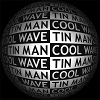[Cheap]
“At some point, I felt that the music needing singing. That without it something was missing. Now, when I write, I feel it is a very natural part of expressing ideas, and a way to bring everything to a point. If you want to say something, you can often say it easier with words. What can be said with words, should be said with words.”
Johannes Auvinen, interview with Boing Poum Tchak!, May 5, 2009.
Since 2004, California-born and Vienna-based Johannes Auvinen has been issuing melancholy, droning homages to acid house, ambient, and brittle synth-wave for Sähkö’s Keys of Life imprint and his own Global A label as Tin Man. But it took four years for Auvinen’s mélange of classic influences to congeal into something timeless in its own right. Chillingly beautiful, his Wasteland mini-album from 2008 stands as one of the most carefully constructed electronic records and subtly satisfying song cycles of the decade, a rare sort of 12″ whose six tracks — despite club-slaying potential in the hands of adventurous jocks — play better in succession than sandwiched within DJ sets.
It’s unclear exactly what the record’s Rashad Becker production credit entailed, but Auvinen’s ceding of studio duties to the Dubplates & Mastering cutting engineer appeared to have vastly increased Tin Man’s production values and, critically, allowed Auvinen’s voice to ascend from his tangle of dusty electronics: Ghostly and probably wearing a cheap suit, Tin Man-the-frontman half-croons across these ominous techno landscapes like David Gahan on his deathbed succumbing to pathological lethargy. Dude’s actually got chops, sort of. Coarse and occasionally unintelligible, Tin Man’s fragile vocals — hardly some humanizing force — were a potentially derisive and distracting addition to these already singular productions. Luckily, his affected singing and lyrical introspection had some serious payoff. In giving Tin Man a voice (and one quick-witted enough to say more than your rote, pitched-down God of Minimal incantation), Auvinen wrote an album of what might literally be the deepest techno music out there.
Now recording for Vienna techno institution Cheap, the Becker-Auvinen studio team has returned with Cool Wave, another six-track concept mini-album about fear, loathing, and expensive sound design at the edge of the planet. To call it an even trippier record than its trippy predecessor belies the fact that Cool Wave boasts one of the year’s slickest techno singles in opener “Constant Confusion.” Smacking of tobias. and Thomas Melchior at their restrained best, the track pairs cracking snare and percolating bass with ambient synth pads and Tin Man’s quasi-atonal vocal melody. It’s tough to imagine a Tin Man track getting much more anthemic than “Constant Confusion,” though it’s easy to speculate how most other producers would take this formula over the top. Morsels of rhythmic ornamentation — a twitching hi-hat, a shuffling shaker, a momentary filter abducting an instrument — pass through the mix like phantasms of big moments, amassing tension but opting out of bulldozing you. I can picture Zip snagging “Constant Confusion” and its club-playable B-side counterpart “Riders” for a Perlon slab. On the latter track, Tin Man sardonically urges all us “drifters” and “riders” to “catch a wave tonight” on his ascending pitched toms and triplet delay trails. It might be less easily digested than “Constant Confusion,” but its oddball buoyancy might just coax dancers to follow Tin Man’s lyrical lead.
Cool Wave‘s four remaining slots mine almost terrifyingly chilled-out moods and tempos — think elevator music in a David Lynch movie. The title track sports a subtly devastating low-end, the wobbling sonic foil for Tin Man’s multitracked, vocoded, and expertly bored syllables. While this heaviness doesn’t extend to the following track, “L.A. Sinking,” the doom remains in its freezing, sputtering drum programming. You’d be a fool to think the arrangement sounds a little Casio; headphones reveal the insane detail of these samples — tricks you’d imagine only a mastering engineer like Becker could conjure, from pitch-twisting filters on the toms to extreme high-end dub trails. “At the end of every day/ The sun still sets on L.A.,” Tin Man informs us repeatedly, as if humanity had long ago fled this city and has to be reminded of its crumbling ruins. On the flip, “California” sets the record’s most overtly venomous vocals against its most tender arrangement. As a staid organ hums cryptic chord changes to the beat of a few naked 808 hits, Tin Man fingers the state’s false promise, alternately intoning “California” and “catatonia.” All good vibes aside, Tin Man suggests, the Golden State is rotten and spineless at its core: “It’s never the sun/ To save anyone.” He continues this acidic sentiment on “Energia”: “We are the ones who ride the waves at the end of days.” Endowed with the set’s messiest sound palate, this 12″ pressure cooker seems ripe to burst. But our Tin Man, sarcastically Zen to the very end, stuffs a New Age platitude plucked straight from yoga class — “Energia… Energia…” — over this sudden rift and lets the church-like ambience fade out. All in all, it’s pretty damning stuff. From his 6,000-mile remove, Johannes Auvinen has crafted a devastating image of his spiritually (and, as of this news cycle, economically) broke homeland. A sonic distillation as nuanced, stylized, and cinematic as anything playing at your local art house, Cool Wave should cement Tin Man’s status as one of techno’s true eccentrics and auteurs. Seriously lulling grooves aside, you absolutely mustn’t sleep on this one.
















dope record, dope review!
I was wondering why everyone wasn’t floored with this when it came out. Great review, and although he’s been around for years, I think he’s truly hit his peak with the two releases mentioned here.